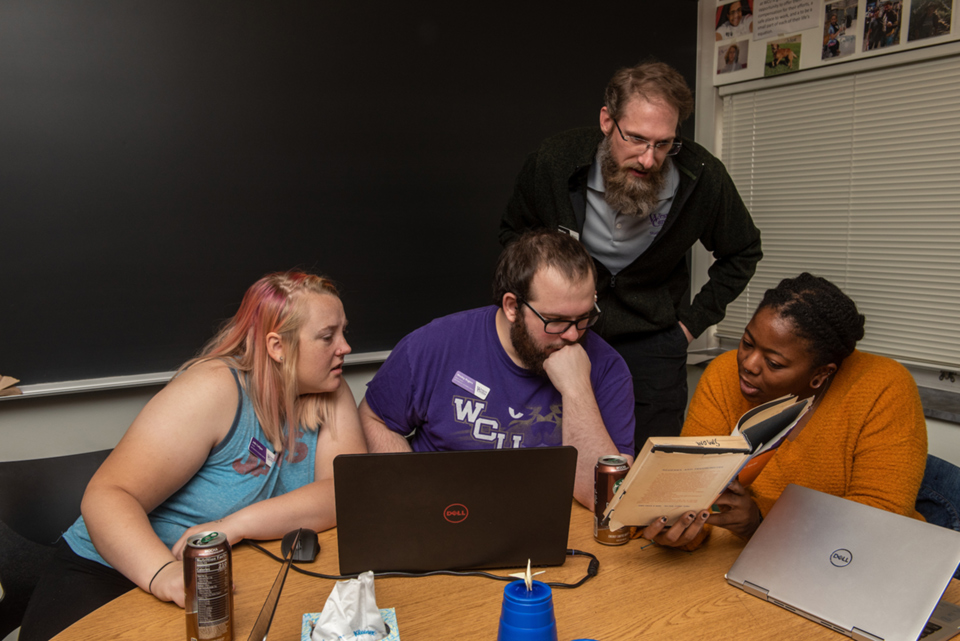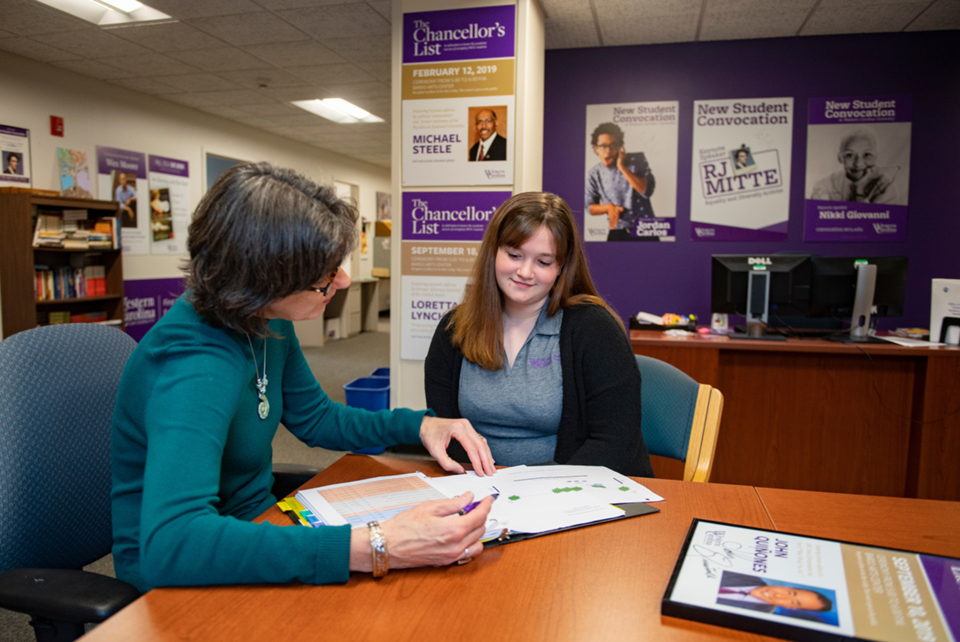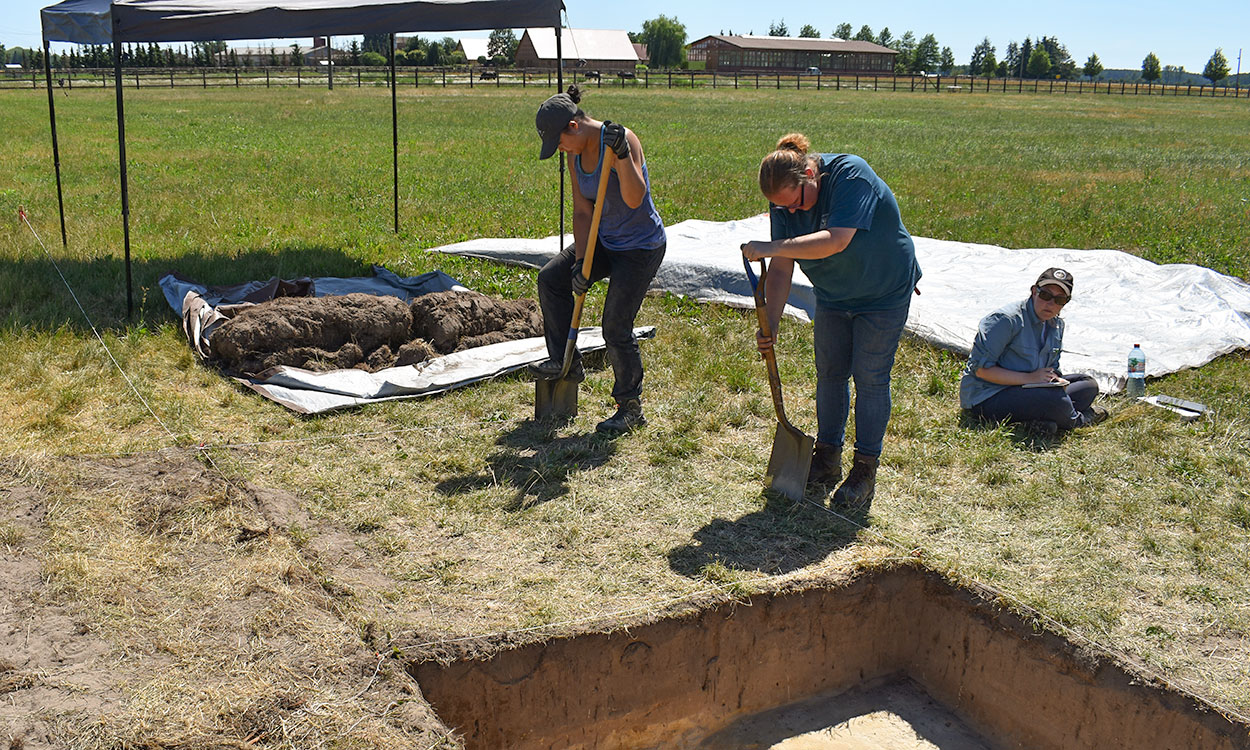










Hire Advantage
Supporting Student Success
Working on your college campus probably won’t make you rich, but what if it offered
something potentially even more valuable in the long term? Like a chance to get paid
to get a richer education, skills that will give you a leg up in your chosen profession,
guidance to make you a stronger employee when you graduate?
Western Carolina University actually offers that – through a program designed to make
student employment a more impactful experience. The program, however, is actually
built not for students but for those who supervise them on campus.It’s called Hire
Advantage, and it’s the brainchild of Carrie Hachadurian, a WCU graduate and student
employment specialist at the Center for Career and Professional Development. Hire
Advantage is designed to coach campus supervisors who work with students so they can
make sure those students get the most out of their campus work experience.
“The point of the program is to flip student employment into a high-impact practice,”
Hachadurian says. “A high impact program is intentional policies and programs that
further advance student development. In our case, that’s student professional development.
So even though it’s a program to support supervisors, the end goal is always student
professional development.”



Theresa Cruz-Paul, director of the CCPD, says that Hire Advantage really filled a
need. “The university was working with students to offer student employment on campus
and that was working fine. But the next level we want to get to is making it a meaningful.
And student employment in the national association is not considered a high impact
practice but a lot of people are having discussions around changing student employment
into one.
“Western decided to focus on that particular area because students receive a lot of
face-to-face time with their supervisors, they get experience on campus, they’re gaining
skills. All of these things are happening. It just wasn’t being highlighted and done
in a systematic way. And so, the Hire Advantage program was developed in order to
support supervisors in offering that practice through their employment on campus…
thinking about how their jobs could offer skill development, how their jobs could
offer meaningful experiences and hands-on work for students, and then helping students
reflect through that experience on their skill attainment and how they’re gaining
the skills throughout their time there.”
So how did Hire Advantage come about? It started when Hachadurian was directly supervising
students herself.
A former journalist, Hachadurian was working as an administrative support assistant
in what was then called the university Writing Center where students were tutored
to help them write papers.


“In that experience, I oversaw between eight and ten office assistants,” Hachadurian
says. “And at the time there was no formal program for supervisors on campus. There
wasn’t even a handbook with policies or suggestions or things we should be doing with
our students. And so, I kind of made my own program with the tutoring center. I created
an employment manual for our students, and I had weekly staff meetings with my students
and sort of treated it like a classroom because that’s what made sense to me.”
In 2013, she moved to the department now known as the CCPD. “I knew I wanted to do
some type of program for supervisors because I did feel lost as a supervisor myself,
and at the time I was barely maybe two of three years older than some of my students,”
she says. “I knew I wanted to do some kind of program for supervisors to provide more
support. I just didn’t know at the time what it would look like.”
About three years later, she entered a master’s degree program in higher education
and learned student development theory. “Then, what I was doing as a supervisor, plus
the knowledge I gained through the masters program, sort of provided the framework
for this program that I created,” she says.
Hachadurian launched Hire Advantage in fall 2017.

Hire Advantage basically consists of three levels. On the first level, supervisors
learn how to make their student employment program a high-impact practice, Hachadurian
says. “What are some things that I should actually be doing as a supervisor to hire
and train my students? What should I be doing to create a student employment manual?”
She says the manual is a requirement for getting certified with Hire Advantage, but
she provides guidance and more, giving supervisors a template already pre-loaded with
university policies. “The other sections are blank for them to fill in. I try to make
it as flexible as I can for each department because each department is going to be
so different than the next,” she says.
The manual template has an interactive table of contents already built in so changes
in the text are automatically updated. The manual is so important because it helps
students understand what’s expected – and how they benefit from working for WCU, Hachadurian
says.
Level two of Hire Advantage builds off the first “in creating and teaching departments
and staff members how to create learning outcomes – if they don’t already have learning
outcomes for their programs,” Hachadurian says. “We’re sort of mirroring what our
academic departments and curricula are doing. We talk about the experiential learning
cycle,” she says. Level two also teaches how to evaluate student workers.
“Level 3 builds on top of that with assessing student outcomes, and there’s managing
Generation Zs … and what makes them different from Millennials. There’s a student
panel in that one where I get students to engage in conversation with faculty and
staff members about their own experiences in college, Hachadurian says.
Using that framework, she says, supervisors learn to build a program that encourages
skill development, professionalism, communication, teamwork and so on.
Hachadurian performs yearly assessments to see how well Hire Advantage is working
and to learn how to make it better. And the assessments indicate that it is making
a difference at WCU.

For example, of students whose supervisors participated in Hire Advantage, 93 percent
said they were satisfied or very satisfied with their employment experience on campus,
versus 82 percent of students whose supervisors did not participate in hire advantage.
Feedback from supervisors also shows that the program is making a noticeable difference
in how supervisors manage students – and how they see students. For instance, one
supervisor, responding to an open-ended question about what they had learned said,
“The Hire Advantage program has helped me to deepen my understanding of the role I
play as supervisor, as well as my understanding of the role of my student employees.
Learning to think about my employees' expectations, concerns, challenges and overall
workload on a deeper level has been useful when thinking about things like end-of-the-year
assessments, employee survey questions, agenda items for monthly employee meetings.”
One supervisor indicated surprise to learn “How much age difference creates an internal
bias against [how] things are measured. Once understood, actions that seemed to be
lazy or unproductive now seemed disengaged simply because I was not using their time
well. Change the viewpoint and the problem may suggest their own solution.”


A supervisor who said Hire Advantage had met expectations, wrote that, “It is a program
that gave me, a student supervisor the tools and insight I need to understand a generation
whose values are so much different than mine.”
In casual conversation, too, supervisors have told Hachadurian how they’re benefiting
from Hire Advantage. One outcome is that students are being helped to actually recognize
their own growth – how much they learn from their campus employment experience.
Another is that the program helps the students engage in their campus work more purposefully,
supervisors say. “In the hiring and training session, I really try to preach that
they need to be meeting with their students on a regular basis. They’re saying that
all of a sudden their students are working as a team even though they don’t work side-by-side
because they’re having that face-to-face time with each other and discussing important
matters with the department.”
Although Cruz-Paul feels more time is needed to get a full sense of how well Hire
Advantage is working, she says that “We’re seeing some effect with the students who
are participating in the programs that have really adopted it, that have formalized
their job descriptions, and really thought about the positions and what they can offer
students and are following through on the reflection pieces. The departments that
are following all the pieces of the program really seem to be having students that
are coming out of that knowing themselves better and knowing their skillsets better.
Students in general are becoming more able to articulate their abilities to future
employers wherever they go outside the university.
Cruz-Paul also says she has “seen students becoming more strategic about where they’re
choosing to work. I think they’re thinking a little bit more about what are the opportunities
and what they can gain from them because we’re posting those job descriptions differently
and we’re highlighting the real benefit that they can get from different positions
on campus,” she says.

Cruz-Paul also points out that Hire Advantage is unique because it brings management
into the process. “As far as I know, this is one of the only programs out there to
support from the top down from the supervisor first, and then works on the student
development through that, whereas a lot of the other programs work directly with the
students” she says.
Student development professionals outside of WCU are starting to see the value of
Hire Advantage; recently, Hachadurian presented the program at the National Student
Employment Administrators Conference in Idaho – a step toward what she hopes will
one day be national recognition for the program.
"it really is our responsibilities to do whatever we can to encourage that growth in our students."
Already, Hire Advantage is winning accolades closer to home. In May, because of the
program, the CCPD won $10,000 in the inaugural Irene W. Welch Customer Service and
Process Improvement Award, designed to recognize excellence in those areas, and named
for a retiree from WCU’s budget office.
If Hachadurian has her way, Hire Advantage will become campus-wide. At this point,
she says, there have been 66 participants in or graduated from the program, including
supervisors, nonsupervisors and faculty members from 40 departments. And some 1,300
students have been involved.
Not bad for a program just entering its third year.
Hachadurian is not resting yet. In the future, she’d like to have Hire Advantage utilized
by all supervisors at WCU, so all student employees could benefit from the program.
“That is my goal,” she says. “Currently it’s not mandatory. People have to opt into
the program. I would love it if every department on campus participated.”
She says it all comes down to enhancing the educational experience. “I challenge all
my supervisors to think about what they’re intentionally doing to help their students
succeed in whatever their students want to do after college. Again, that’s ultimately
our end goal – students and their professional development,” she says.
“As educators – and I believe that we are all educators, including supervisors on
campus – it really is our responsibilities to do whatever we can to encourage that
growth in our students. That’s the whole point to this program. It’s a free program
and it’s just a way to support those who, like me were sort of thrown into student
employment.”
Cruz-Paul says Hire Advantage shows the benefits of innovative thinking in higher
education. “I think Carrie’s development of this program is brilliant in the fact
that this shows exactly what the dedication of university faculty and staff is to
students,” she says. “She identified an issue and a problem, took that as fodder for
her thinking about how to develop something that would benefit those students and
really moved forward with it.”

